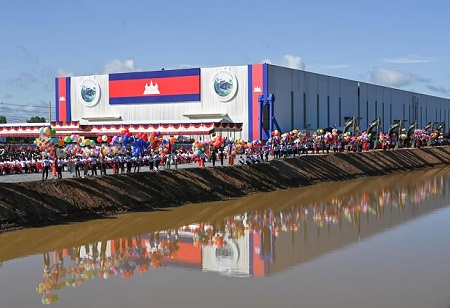
Cambodia PM Unveils $1.7 Billion Historic Canal to Connect Mekong to Sea

 Cambodia’s Prime Minister Hun Manet inaugurated a contentious $1.7 billion canal project designed to create a new connection from the Mekong River to the sea. During the launch event in Prek Takeo, located southeast of the capital Phnom Penh, Manet described the 180km (110-mile) project as "historic," amidst fireworks and drumbeats. “We must build this canal at all costs”, he said.
Cambodia’s Prime Minister Hun Manet inaugurated a contentious $1.7 billion canal project designed to create a new connection from the Mekong River to the sea. During the launch event in Prek Takeo, located southeast of the capital Phnom Penh, Manet described the 180km (110-mile) project as "historic," amidst fireworks and drumbeats. “We must build this canal at all costs”, he said.
Once completed, the Funan Techo canal will run from a spot on the Mekong river, about an hour’s drive southeast of Phnom Penh, to the sea in the Gulf of Thailand. But the project is shrouded in uncertainty, including its main purpose, whether for shipping or irrigation, who will fund it, and how it will affect the flow of the Mekong, one of the world’s longest rivers.
Conservationists have long cautioned that the Mekong River, which accounts for up to a quarter of the world’s freshwater fish catch and half of Vietnam’s rice production, is threatened by infrastructure projects, pollution, sand mining, and climate change. Cambodia, Laos, Vietnam, and Thailand, as signatories to the 1995 Mekong River Agreement, oversee the allocation of the river’s resources.
Cambodia has informed the Mekong River Commission (MRC) about its canal plans, but Vietnam seeks further details regarding the project. Phnom Penh contends that the project impacts only a tributary of the Mekong, thus only necessitating the notification already provided. The canal, a hallmark infrastructure initiative of former Prime Minister Hun Sen, is viewed as a significant national endeavor intended to bolster support for his successor and son, Hun Manet.
Hun Sen, who ruled Cambodia for over three decades, has described the canal as giving the country a “nose to breathe through”. The government says the project will offer an alternative for container ships that currently cross into Vietnam before heading to the sea, allowing Cambodia to keep transport revenue in-country. It says it is planning riverside economic zones along the route that it says could create tens of thousands of jobs for the country, which is among the poorest in Southeast Asia.
Last year, the China Road and Bridge Corporation (CRBC), a major Chinese construction firm that has funded other infrastructure in Cambodia, agreed to conduct a feasibility study for the project. Cambodian officials have indicated that the Chinese state-owned company might finance part of the canal, but CRBC has yet to release its study or make any public commitments. Although Cambodia is a close ally of Beijing, Hun Sen has denied that the canal will be part of China’s Belt and Road infrastructure initiative.

